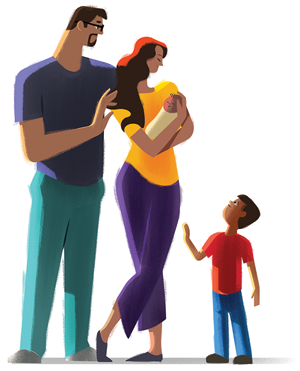BJU Press’s middle and high school Bible product line guides students through a systematic study of the Bible and its significant themes. As they conduct an inductive Bible study exploring the Creation, Fall, Redemption story of the Bible, delve into major Bible doctrines, and develop a biblical worldview, students will learn to value and use hermeneutical principles based on exegesis. Ultimately, this program leads students to form and defend a biblical worldview, evaluate other beliefs, and engage their culture with truth and love.
Program Approach for Bible
With the continuing influence of secularism on Christian thought, the formal Bible class within a Christian school can help shape students, families, and future church leaders who know their Bible and can apply biblical principles appropriately and faithfully to the issues of life today. While the family and the local church are central in the New Testament plan, Christian education can support both of those institutions with a structured, intentional, and practical study through the Bible. A general, moralistic approach to teaching Bible isn’t an option. Christian educators need a grade-level-appropriate program that approaches Bible study with the same academic rigor they use to approach science, history, and every other academic discipline.
The BJU Press middle school Bible program endeavors to help students understand the Bible as a singular, cohesive story with the truths that they need for everyday life. As students study Scripture for themselves, our hope is that they see the heart of God behind the pages of Scripture and walk away with a deeper knowledge of God and a greater love for Him. This program also seeks to equip students with the skills they need for sharing the truth of God with others and defending their own worldview in clear and winsome ways.
Throughout the BJU Press high school Bible program, students will explore and develop skills for Bible literacy and study. In learning these skills and Bible doctrines, they will consistently be asked to make applications to their lives and other real-life situations. Students will also learn to communicate their beliefs to others. Ultimately, this Bible program leads students to love God and serve others.
Presenting the Authority of the Bible
Since the Bible is the authoritative word of God, it directs every area of life. Students need to trust in it and believe what it says for it to change their day-to-day lives. Before students can trust in, believe, and apply the Bible to their lives, they must understand that the Bible is true and is the ultimate authority. Each course explores the authority of Scripture, but Biblical Worldview: Creation, Fall, Redemption leads more extended discussions on how the Bible proves its own authority. In grade 6, Basics for a Biblical Worldview explores the ultimate authority, which leads to the ultimate proof. If God, the Creator, says it is true, and He cannot lie, then His witness must be taken as proof that the Bible is true. Biblical Worldview: Creation, Fall, Redemption takes the discussion further, establishing that all people believe what they believe about the things they cannot see—and about quite a few things they can see—by faith. It is by faith that Christians accept that the Bible is true and has ultimate authority over their lives, regardless of what human wisdom might say on the matter.
The BJU Press Bible program reinforces the authority and truth of Scripture by constantly pointing students back to it for answers and insight on all kinds of issues. Many chapter sections begin with a Bible reading and all grades include suggested Scripture memory.
Tracing the Big Story of Scripture
From Genesis to Revelation, the Bible tells a single, unified story that can be summed up in three words: Creation, Fall, Redemption. In the beginning, God fashioned a beautiful, sinless world out of nothing, but Adam chose to violate the one command God had given him. Because of his disobedience, all mankind was banished, and the world was subjected to the consequences of his sin. But God in His unsurpassable kindness chose to rescue His own creation. Jesus Christ, the sinless Son of God, became a man Himself and suffered mankind’s punishment so that mankind could be rescued. As students understand the cohesive narrative of Scripture, they must be able to follow the story from the Old Testament through the New Testament.
To help students recognize and follow the storyline both in the Bible and in life, students will explore the three key elements of the story in each level of the BJU Press Bible program. The middle school Bible program begins with Basics for a Biblical Worldview, which enables students to make sense of the world through the lens of Scripture. From there, the program journeys through the Bible. The Story of the Old Testament traces the overarching narrative of Scripture from Genesis through Malachi, and The Life of Christ celebrates Christ as the ultimate fulfillment of all Old Testament promises. The Triumph of Christ traces the origins and development of the church in Acts, the doctrinal arguments in the Epistles, and the consummation of God’s redemptive plan in Revelation. Biblical Worldview emphasizes the entire Creation, Fall, Redemption storyline and applies it directly to science, history, arts and culture, marriage, family, and government.
Teaching Bible Study Skills
It is impossible for students to integrate biblical truth into their lives if they cannot connect with God’s Word in a meaningful way. In a culture pervaded by sin and self-centered thinking, students must be given the skills they need to read God’s Word for themselves and apply His truth to their everyday decisions.
Our course materials provide a three-step approach for students as they study Scripture: observe, interpret, and apply. While each course will introduce all three steps for studying the Bible, different courses will emphasize different steps. The Story of the Old Testament emphasizes observation. The Life of Christ emphasizes interpretation. Students will continue the last step, application, in The Triumph of Christ. Students will learn to see the heart of God behind the pages of Scripture, derive principles based on what they see, and then align their daily actions with those biblical principles.
The BJU Press Bible program encourages students to observe the Bible passages they are reading—they must look at the whole passage, noting facts and details to encourage recall and to get a bigger picture of the context. To aid in accurate interpretation, we teach students important skills for uncovering the meaning of Bible passages. They might be directed to look up definitions, compare events and passages, or consider the major events or beliefs of the time. They will also need to interpret passages in light of the entirety of Scripture—primarily the character of God and His stated intentions for mankind. In the application step, students will need to move from understanding Scripture to living it out.
Applying a Biblical Worldview
The products of BJU Press are intentionally designed with biblical worldview touching every component of our courses. We want our students to leave all of our courses overwhelmed with the beauty and goodness of God and equipped to tell others about Him.
As students interact with the biblical principles carefully discussed in our Bible courses, they will be able to connect a biblical worldview with the decisions they have to make on a daily basis. As students advance in their skills for reading and understanding Scripture, students will grow in wisdom as they discern the heart of God behind His commands and see how the grand narrative of Scripture compels them to live each day.
Developing and Encouraging Love for God and Personal Growth
As students recognize the authority of Scripture, see how it applies to every area of life, and learn how to study it, they should grow in their knowledge of and love for God. This growing love should be evident in the students’ behavior, their desire to worship God, and their continued submission to God in every area of their lives. While only God holds the power to produce real change in a student’s life, the BJU Press high school Bible program has been designed to be a tool God can use to bring about lasting change.
Bible Doctrines teaches the scriptural bases for the major doctrines of the Christian faith so that students can develop their own beliefs and connect those beliefs to everyday decisions. Scripture memory will give students valuable verses to remind them of the love and grace of God. Thinking It Through questions will regularly ask students to apply biblical teaching to their lives. The student activities offer an ongoing prayer journal that teaches students how to pray specifically and scripturally. Feature boxes will also encourage students to consider how biblical teaching applies to them.
Teaching Biblical Apologetics
Scripture tells us to always have an answer ready for the hope that lies within us (1 Peter 3:15). Students need to know how to defend their beliefs to those who would disagree. Our course materials will enable students to kindly and clearly engage with the world around them. To learn the difference between false teaching and teaching that is biblically based, students will compare beliefs with what the Bible teaches and how it teaches them. Through critical thinking and evaluation of many ideological battlefields, students will learn to conduct meaningful conversations on subjects such as self-identity, absolute truth, and creation vs. evolution. Discussions offer opportunities for teachers to remind students of the verses, principles, and doctrines they have learned, and debates give students a direct opportunity to articulate and defend what they believe on controversial issues. Additional notes in the teacher editions will also provide opportunities for teachers to address and correct student misconceptions about commonly held beliefs or principles.
Encouraging Cultural Engagement and Evangelism
The Great Commission commands the followers of Christ to go into all nations to share the gospel. Therefore, the BJU Press Bible program prepares students for this work by teaching them how to share the gospel with others. Since cultures think differently about the basic questions of life, our products will also teach students to understand how the cultures of the world are different and how believers should take that into account when they share the gospel. Christians should also engage with the current culture to push it back toward the structure that God created—how He created the world to work.
Facilitating Informed Discipleship
Our high school Bible program should grow Christian leaders and disciplemakers through consistent exposure to God’s Word, dedicated study of biblical principles, and regular application to real life. These leaders and disciple-makers will not be subject to the trap of legalism. Instead, they will be able to act according to the teachings of Scripture in the freedom of Christ, explain the big story of Scripture to others, and defend the authority and truth of the Word of God. To help develop this kind of leader, the student editions offer application questions in the unit reviews. Additionally, handouts available in the teacher editions provide further studies of important concepts.
Concluding the Bible Program
The BJU Press Bible program endeavors to equip students to comprehend and defend their faith. By recognizing the Bible as the ultimate authority for life and Jesus Christ as mankind’s promised Savior, students are empowered to live boldly for Christ and share the gospel for the glory of God. The middle school Bible program expounds on the foundational concepts taught in elementary grades with a more in-depth look at the Bible itself. The high school Bible program serves to advance students from a thorough knowledge of Scripture to practical skills for studying the Bible for themselves, growing in their knowledge and love for God, and sharing their faith with others.
Vision
To equip students with biblical literacy, Bible study skills, and biblical doctrine so that they can grow in their relationship with Christ, develop and internalize a biblical worldview in order to develop character, solve real-world problems, and communicate that worldview to others.
Goals
- To master Bible study skills through independent and collaborative research and study
- To confirm the Bible as the ultimate authority for faith and practice
- To help students trace the Creation, Fall, Redemption storyline of Scripture
- To help students understand and relate the Old Testament to the New Testament and Jesus Christ
- To develop student ability to observe, interpret, and apply the Word of God to their lives
- To develop a greater love for God that leads to worship and properly motivated obedience
- To enable students to clearly explain their Christian beliefs to their family and friends
- To defend biblical doctrine and refute false teaching and philosophies
- To encourage appropriate cultural engagement and evangelism
- To facilitate informed discipleship
Materials
Student Edition
The student edition for each course is divided into sections by topic and suggests Scripture memory and Scripture reading as applicable. Visual elements help the students understand the text better. Feature boxes explore background information, real-life examples, or pressing questions. Thinking It Through questions and unit reviews provide opportunities for discussion or formative assessment. Each student edition will give students a starting place to develop their knowledge and application of Scripture.
Teacher Edition
The teacher editions provide a thorough guide for each section of the student editions. Section objectives give the big picture for a few days of instruction, and preparation information gives a starting place for planning and teaching, including insight on worldview shaping, key questions, and resources for further reading. Teaching strategies provide discussion prompts and guides, writing activities, group collaboration, and teaching tips. Handouts for student use are available for going deeper on specific topics. The teacher editions also provide answers for Thinking It Through questions and unit reviews.
Student Activities
The student activities provide a vital opportunity for direct application of course objectives. Each activities book focuses on Bible study and interpretation and connection with real life application. Students are pushed to evaluate false beliefs and worldviews and defend a biblical worldview. The student activities also offer a prayer journal to teach students how to pray specifically and scripturally, as well as Scripture memory explanations and tips. The corresponding answer keys provide overprint answers for grading.
Assessments
Preprinted assessment packets include chapter or unit tests with questions that reflect the student edition and align with the objectives listed in the teacher edition. Questions may cover Scripture memory, terms, basic content, concepts, principles, and application. The corresponding answer key provides overprint answers for easy grading.
Scope & Sequence

Bible 6
An introduction to the concept of worldview that encourages students to think about the way they think (metacognition)
Introduces students to the parts of a worldview: the big story of the world; the beliefs and values that come out of that big story; and the resulting actions of both individuals and cultures.
Uses the Bible to answer the worldview questions: Where did I come from? Why am I here? What’s wrong with the world? What can make it right? Where am I headed?
Encourages students to evaluate non-biblical worldviews in light of the Scriptures
Helps students understand their identity in God’s big story—created in the image of God, fallen in Adam, and redeemable in Christ
Encourages students to obey the Creation Mandate and the Great Commandments to love God and their neighbor
Encourages student to strengthen society through their relationships with their families, friends, and communities
Equips students to deal with other worldviews and religions with answers from the biblical worldview

The Story of the Old Testament
Takes students on a journey through the story of the Old Testament, including both the Major and Minor Prophets
Special studies: the narrative sections of the Old Testament are complemented by features that cover the “writings” sections of the Old Testament
Points students to Jesus Christ, who will fulfill all of the promises of redemptive history prophesied in the Old Testament
Focuses on the Bible study skill of observation

The Life of Christ
A study of the words and works of Christ in the Gospels (particularly the book of Matthew) as they relate to the Messianic fulfillment of the one true big story of God’s redemptive plan and the coming of the kingdom
Focuses on the Bible study skill of interpretation and the applicational emphasis of Christlikeness or sanctification

The Triumph of Christ
A study of the one big story of Scripture (Creation, Fall, Redemption) from Acts to Revelation and the instruction for the church on how to live out the beliefs and values that are derived from that one true big story
Focuses on the Bible study skill of application and reinforces the proper model of sanctification for maintaining a holy walk

Bible Doctrines
Guides students as they understand and apply the major biblical doctrines, equipping them to know what they believe and why they believe it
Helps students develop skills in harmonizing all that the Bible teaches on various topics by participating in collaborative research, analyzing various texts and sources, and contributing to group discussions
Includes case studies and doctrinal dilemmas to help students develop 21st century skills as they respond to relevant challenges to upholding and applying truth to life

Biblical Worldview
A positive presentation of the biblical worldview (the big story, beliefs and values, cultural action) with a critical examination of secularism
Analyzes and evaluates approaches to cultural action so that Christians will live faithfully in light of redemption as both salt and light in every area of life

Ethics
Bible Content
Introduces students to various ethical systems, how they differ from one another, and how to evaluate each system according to a biblical worldview; Develops student’s understanding of an approach to ethics that will enable them to grow in virtue and to relate biblical wisdom to a variety of ethical situations; Equips students to defend a biblical ethic in a culture of competing ethical claims and diverse lifestyles.
Bible Unit Studies
Unit 1: Foundations for Ethics; Unit 2: Virtues; Unit 3: Issues





